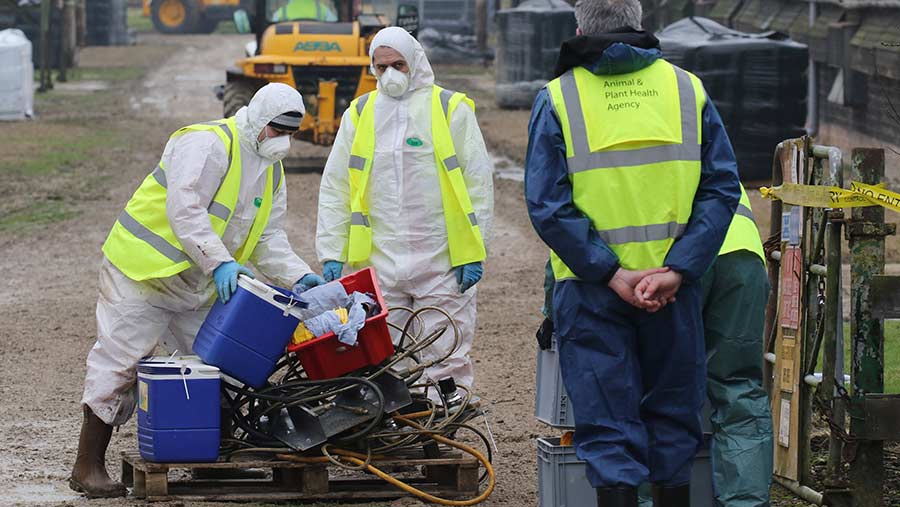Avian influenza strikes again as 20,000 turkeys lost
Nearly 20,000 turkeys are to be culled following the discovery of H5N8 avian flu at a commercial rearing unit in Frithville, near Boston, Lincolnshire.
It is the third case of avian flu affecting poultry farms in Lincolnshire since the first outbreak was confirmed in mid-December – and the sixth in total.

Defra officials dealing with H5N8 strain of avian flu on a farm near Boston Lincolnshire © Tim Scrivener
It follows an outbreak in 10,000 farmed breeding pheasants in Wyre, Lancashire earlier this week, which was preceded by an outbreak among 6,000 turkeys in the East Lindsey district of Lincolnshire on 16 January, and on another Lincs turkey farm in December.
See also: Avian influenza strikes commercial pheasant farm
There have also been two outbreaks of avian influenza in backyard flocks in Yorkshire and South Wales this month, and 16 cases detected in wild birds since the middle of December.
Defra announced it had placed a 3km Protection Zone (PZ) and a 10km Surveillance Zone (SZ) around the latest infected premises, to limit the risk of the disease spreading.
Poultry dense area
According to NFU chief poultry adviser Gary Ford, there are a significant number of other poultry units within the 10km SZ – including layer farms, broiler units and other turkey enterprises. “Unlike the Lancashire case, where much of the SZ is in the Irish Sea, this is quite a poultry-dense area.”
These farms will still be able to move feed and table eggs under a general movement licence, so long as all the biosecurity protocols are met. This reflects the fact that, nationally, the actual AI risk has not changed, as the whole country is being treated as a Prevention Zone.
But movements of meat, live birds or hatching eggs will still require a specific licence from the Animal and Plant Health Agency (APHA).
Restocking of farms will also be prevented until after the SZ is lifted around the area, which will not be for at least another month.
Free-range status
Meanwhile, free-range poultry continue to be housed wherever possible, under a national housing order, which is due to stay in place until 28 February.
What happens thereafter remains unclear. Under EU rules, broilers and layers can retain their free-range status for 12 weeks if they are forcibly housed.
But this period runs out on 28 February (16 March in the case of Northern Ireland), suggesting eggs will have to be sold as “barn eggs” if the birds are still not allowed outside, while broilers will also have to be renamed as something other than “free range”. Both will involve a loss of valuable premium.
Several EU member states have been lobbying for an extension to the 12 weeks and the issue was raised by the Netherlands delegation at a meeting of EU farm ministers in Brussels this week. The Dutch first housed their birds on 9 November, suggesting their 12-week limit will be up next week (1 February).
While expressing sympathy with producers, EU farm commissioner Phil Hogan said that the expectations of consumers also had to be respected.
“This is a balance that we have to strike – to help producers on the one hand and consumers on the other,” he said. No final decision was taken.
See also: Avian influenza – The signs and symptoms
